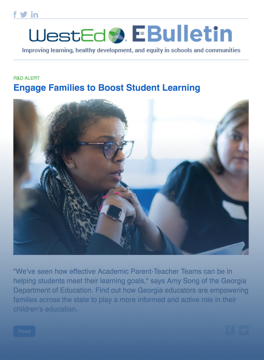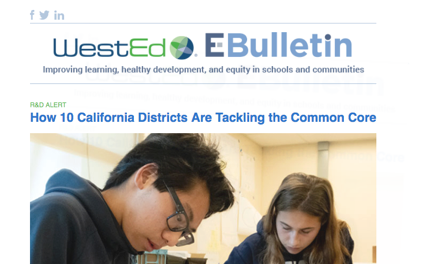Top Downloads
-
Zone of Proximal Development: An Affirmative Perspective in Teaching ELLs
Learn how collaboration impacts the academic development of English language and multilingual learners.
-
What Are Social and Emotional Learning and Culturally Responsive and Sustaining Education — and What Do They Have to Do with Critical Race Theory? A Primer
This brief explores the intersections and perceived connections between social and emotional learning, culturally responsive and sustaining education, and critical race theory.
-
California Professional Standards for Educational Leaders (CPSEL) Updated Tri-Fold Version
This version of the California Professional Standards for Education Leaders is a quick reference most helpful when used with the updated Moving Leadership Standards Into Everyday Work: Descriptions of Practice.
-
Scaffolding Writing With the “Teaching and Learning Cycle” for Students in Grades 6–12
This article explains a process through which teachers can scaffold students’ successful writing called the “Teaching and Learning Cycle" to best serve multilingual learners as well as English-proficient students.
-
Scaffolding Writing Through the "Teaching and Learning Cycle"
Help your students become effective writers through scaffolding and the Teaching and Learning Cycle.
-
Self-Care Strategies for Educators During the Coronavirus Crisis: Supporting Personal Social and Emotional Well-Being
Addressed to educators who face the stresses of the pandemic and the resulting school closures and online service provision, this brief offers practical information and guidance on self-care.
-
California State Special Education Funding System Study, Part 2: Findings, Implications, and Considerations for Improving Special Education Funding in California
This report explores an in-depth quantitative analyses of California’s system for special education funding and offers evidence-based considerations to help inform state-level decision-making and improve equitable outcomes for students with disabilities.
-
Infant and Toddler Spaces: Design for a Quality Classroom
This free guide, a collaboration between WestEd’s Program for Infant/Toddler Care (PITC) and Community Playthings, provides practical, research-based information on creating surroundings conducive to high quality infant/toddler group care and education.
-
Serving the Whole Person: An Alignment and Coherence Guide for State Education Agencies
This guide helps SEA leaders achieve greater alignment and coherence in their whole-person initiatives through an adaptable and guided process.
-
Anti-Racist Evaluation Strategies: A Guide for Evaluation Teams
This Anti-Racist Evaluation Strategies Guide was designed to help evaluators increase their awareness of racism that might be present in the course of an evaluation and to help teams employ strategies to conduct anti-racist evaluations.
-
Sound Basic Education for All:
An Action Plan for North CarolinaThis action plan provides recommendations for the state of North Carolina's efforts to improve its education system to benefit all learners.
-
California Special Education Funding System Study, Part 1: A Descriptive Analysis of Special Education Funding in California
This report details the current special education funding system in California, its history, and the role of the state and intermediaries in the distribution and use of those resources.
-
Can Restorative Practices Bridge Racial Disparities in Schools? Evidence from the California Healthy Kids Survey
In this brief, we investigate whether increasing student exposure to restorative practices could help reduce racial discipline and achievement gaps, drawing from a large sample of secondary students who completed the California Healthy Kids Survey between the 2013/14 and 2018/19 school years.
-
Four Domains for Rapid School Improvement: A Systems Framework
This framework assists educators in rapid school and district improvement efforts through turnaround leadership, talent development, instructional transformation, and culture shift.
-
Creating Trauma-Informed Learning Environments
This brief, produced by the Mid-Atlantic Comprehensive Center at WestEd, offers five important actions teachers can take to design trauma-sensitive learning environments.
View More

Stay Connected
Subscribe to the E-Bulletin and receive regular updates on research, free resources, solutions, and job postings from WestEd.
Your download will be available after you subscribe, or choose no thanks.





















